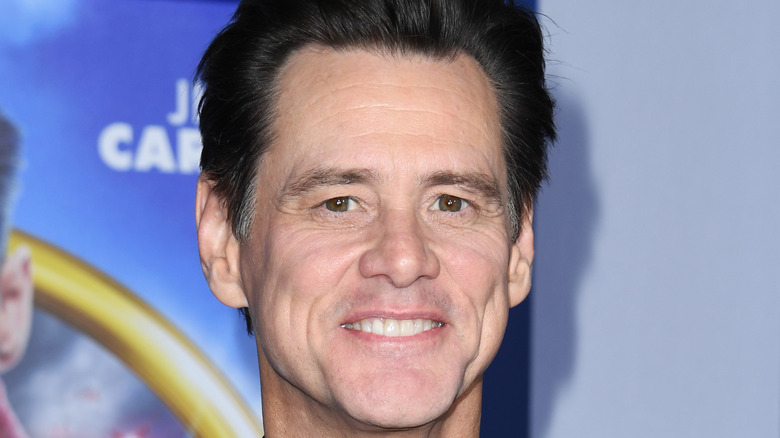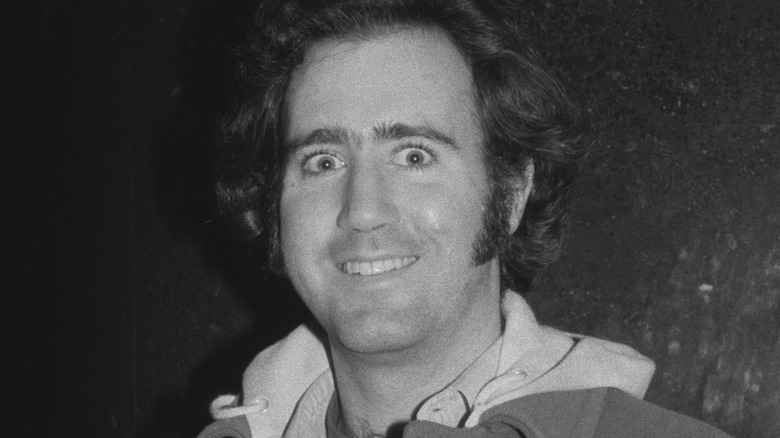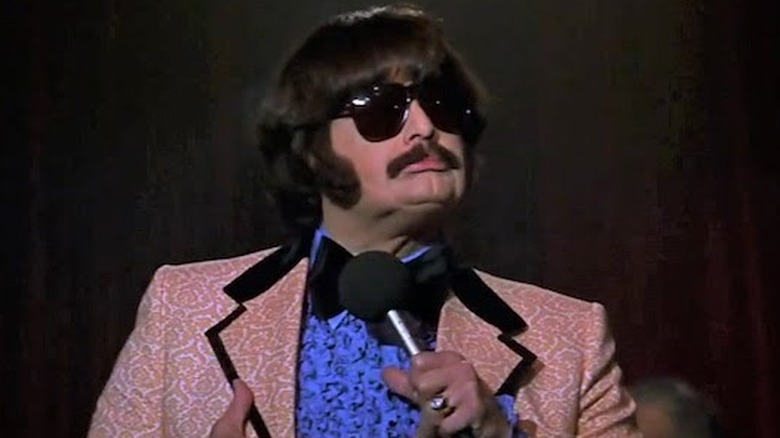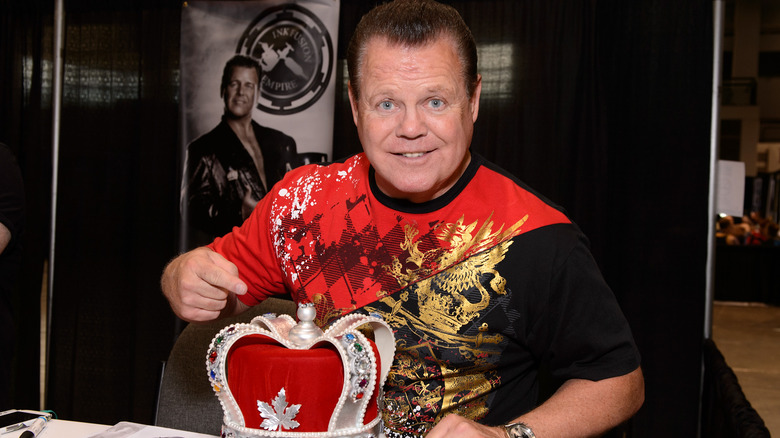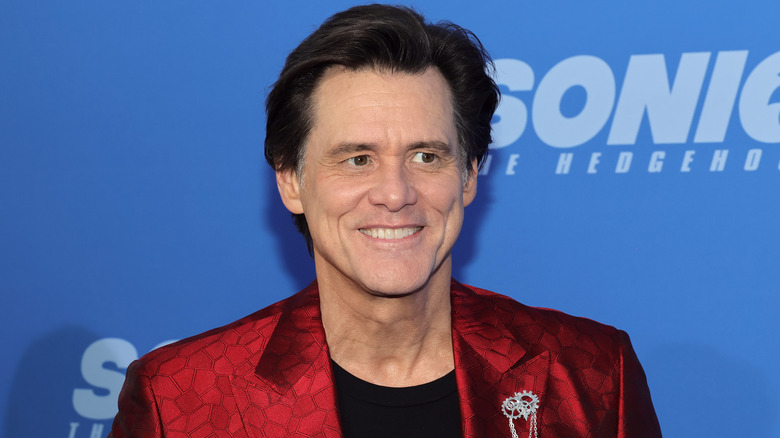Why Jim Carrey's Andy Kaufman Performance Was So Controversial
When actor-comedian Andy Kaufman died on May 16, 1984, at the age of 35, many were convinced that he was playing yet another elaborate, boundary-pushing prank. He did, after all, have a reputation for shocking people while staying fully in character, showing no concern whatsoever if he ended up offending or befuddling his audience in the process. Tragically, his death was not a ruse or a hoax, and it brought an end to a short, controversial, yet brilliant career that would influence many up-and-coming comedians, including a young man from Canada named Jim Carrey.
Fresh off the success of films such as "Ace Ventura: Pet Detective," "The Mask," and "The Truman Show," Carrey took on his most ambitious role to date when he starred as Kaufman in the late comic's 1999 biopic, "Man on the Moon." Decades later, people are still talking about Carrey's impressive — yet oftentimes disturbing — method acting in the film, which saw him take on many of Kaufman's mannerisms and quirks and almost completely lose himself in his character. It was a controversial portrayal, to say the least, but why did Carrey's performance as Kaufman get such a polarizing response?
Carrey insisted on being called Andy, not Jim
In professional wrestling, which Andy Kaufman was incidentally a big fan of (more on that later), it's not unusual for wrestlers to call each other by their ring names as opposed to their given names. That phenomenon, however, doesn't extend to the world of acting ... except in extreme cases such as Jim Carrey practically transforming into Kaufman on the set of "Man on the Moon." He was so dedicated to his role that he allegedly asked people on set to call him Andy, and while he admitted years later that things were "psychotic" at times, Carrey remained adamant that it was the late Kaufman who was leading the way.
"The true author of the project is Andy and his genius, the fact that he committed so completely to what he did, really made that possible and made it essential for me to lose myself," Carrey told The Hollywood Reporter. "I don't feel like I made the film at all. I feel like Andy made the film." He also noted that since his real self "didn't exist at that time," Kaufman also "affected" his performance in subsequent films such as "The Grinch."
He also stayed in character as Kaufman's abrasive Tony Clifton
In addition to his insistence on being called by the name of the long-deceased person he was playing, Jim Carrey also dove deep into the characters that Andy Kaufman portrayed. TV viewers who were around in the late '70s and early '80s probably know Kaufman best for playing the naive, yet hilarious mechanic Latka Gravas on "Taxi," but the actor was also known for playing a much darker and potentially problematic character, the foul-mouthed lounge singer Tony Clifton. As explained by Las Vegas Weekly, Clifton was conceptualized as a parody of bad Vegas lounge acts. He was meant to be an individual who thinks he's more talented and important than he really is, and doesn't have any problem with acting rude and hostile toward audiences who can't take his awful singing and bad attitude.
Carrey likewise stayed in character whenever he'd be channeling Kaufman-as-Clifton, and at times, that included verbally abusing and swearing at director Milos Forman. In a 2017 interview, Carrey had nothing but praise for Forman, but also explained that he had to do what Tony Clifton would do in such a situation, even if he had to bully the man who was helming the movie. "I love Milos and I respect him greatly, but Tony doesn't," he told the Los Angeles Times. "Somewhere in the background, there's a little piece of Jim going, 'Oh, no, you're not going to do that.' But I was just along for the ride."
The incident with Jerry Lawler
Aside from advertising himself as the "Inter-Gender Wrestling Champion of the World" well before it briefly became commonplace for men and women to fight each other in the squared circle, Andy Kaufman had an extensive feud with professional wrestling legend Jerry "The King" Lawler, one that saw the two entertainers get into a heated altercation on a 1982 episode of "Late Night with David Letterman." That rivalry, however, was a work, and Kaufman and Lawler were friends in real life, as is often the case with two wrestlers pretending to hate each other in the name of kayfabe. This fact was apparently lost on Jim Carrey during the making of "Man on the Moon," as Lawler, who played himself in the film, recalled to "Stone Cold" Steve Austin in 2020.
As quoted by 411Mania, Lawler said on Austin's "Broken Skull Sessions" in 2020 that he complained to Milos Forman about Carrey's method acting, stressing to the director that the actor should have been aware of Lawler and Kaufman's real-life friendship. "And he goes, 'Oh, Jerry. Jerry. He's the 800-pound gorilla. What can I do?' And that was the truth at that time," the WWE Hall of Famer continued. "He was the top draw, he was like The Rock today, he was the top name in Hollywood. And he got it in his head, I don't know if you call it method acting or whatever, he was going to channel Andy Kaufman. He became Andy Kaufman for these 80 days that we were on the set filming this movie, so it was crazy."
According to Lawler, there was even a point where Carrey hurled a glass bottle filled with orange juice in his direction (via The Independent). Fortunately, "The King" escaped what could have been a serious injury as the bottle barely missed him.
Martin Freeman recently had some choice words for Carrey and his method acting
Certain people remained disturbed by Jim Carrey's method acting in "Man on the Moon" even years after the fact, and that included actors who weren't even involved in the film. During a 2021 appearance on the "Off Menu" podcast (via The Independent), "The Hobbit" and "Sherlock" star Martin Freeman commented on Carrey's dedication to playing Andy Kaufman, calling his performance "self-aggrandizing, selfish, and narcissistic" as well as "highly amateurish." He also opined that Carrey should have been fired from the movie for taking things way too seriously in his portrayal of Kaufman.
"I am a very lapsed Catholic but if you believe in transubstantiation, then you're going somewhere along the line of, 'I became the character,' no you didn't, you're not supposed to become the f***ing character because you're supposed to be open to stuff that happens in real life because someone at some stage is going to say 'cut' and there's no point going, 'What does cut mean because I'm Napoleon?' Shut up," Freeman huffed. He also underscored the importance of remaining grounded in reality and separating one's real self from the part they are playing, even if it's understandable for actors to immerse themselves in the roles they play in between takes.
Carrey had a hard time finding himself again after playing Andy Kaufman
Although he went on to star in well-loved films such as "Bruce Almighty" and (especially) "Eternal Sunshine of the Spotless Mind" in the years following "Man on the Moon," staying in character as one of the most innovative — and unpredictable — comedians of all time took its toll on Jim Carrey. This was a subject he explored in depth in the 2017 documentary "Jim & Andy," a film that drew from close to a hundred hours of behind-the-scenes footage from "Man on the Moon" and was produced by Carrey's close friend Spike Jonze.
Carrey told the Los Angeles Times in an article covering the documentary that there were only a few times where he was truly himself during the four months in which "Man on the Moon" was made. "I didn't black out, but the balance was way in Andy's corner," the actor admitted. "I broke a couple of times on weekends and stuff, but pretty much from when I woke up to when I went to bed, the choices were all his."
All in all, it took quite a while before Carrey mostly recovered from the harrowing process of becoming Andy Kaufman. "The process over time has been, 'Oh, even that is not real. Even that is not solid,'" he explained, adding later on that he hopes to eventually liberate himself by coming to terms with how he was only playing a part in a movie.
